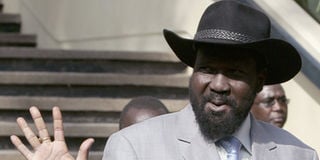South Sudan calls for calm after president sacks cabinet

South Sudan's president Salva Kiir Mayardit.
What you need to know:
- While Juba has been rife with rumours in recent weeks about a potential reshuffle by Kiir -- especially concerning tense relations with Machar -- the move still caught many by surprise.
JUBA
Heavily armed South Sudanese security forces guarded key government institutions in the capital Juba Wednesday as radio broadcasts called for calm after the president suspended his cabinet and his main political rival.
Those removed by President Salva Kiir include two of the country's most influential leaders -- his rival vice-president Riek Machar and Pagan Amum, secretary-general of the ruling party, the Sudan People's Liberation Movement (SPLM).
The sackings have sparked concern over potential instability in the fledgling nation, which is awash with guns, riven by ethnic rivalries and still reeling from decades of war.
"Give the president a chance to form his government," said Barnaba Marial Benjamin, who until his suspension late Tuesday was the information minister and government spokesman.
All ministers and their deputies were suspended, in addition to 17 police brigadiers.
"He has already empowered the technocrats to see the day-to-day running of the administration," Benjamin said in a broadcast on UN-supported Radio Miraya.
Troops and armed police blocked several key roads in Juba, with a heavy presence at the government ministry complex, but army spokesman Philip Aguer said the city was calm and called the deployment "routine work."
Many of the ministers were key figures in the rebel SPLM or its armed wing that fought a brutal 1983-2005 war against the government in Khartoum, which led to a 2011 referendum in which South Sudan voted overwhelmingly to split from the north.
Machar, from the Dok Nuer people from the key oil producing Unity state, is a controversial figure but commands loyalty among many branches of the Nuer, which form an integral part of the footsoldiers of the new nation's ex-rebel army.
He has made no secret of his desire to challenge Kiir for the presidency in elections due in 2015.
However, he fought on both sides of the civil war, leading a splinter SPLM faction that sided with Khartoum, battling troops commanded by Kiir, who comes from the Dinka people.
Machar's troops are accused of a brutal massacre in the ethnic Dinka town of Bor in 1991.
"This latest move is part of an ongoing struggle in the highest levels of South Sudan's political leadership," said Akshaya Kumar of the US-based Enough Project, which campaigns for peace in the Sudans.
However, Charles Manyang, foreign affairs undersecretary and now temporarily in charge of the ministry, dismissed fears the sackings were part of an "internecine power struggle", telling reporters it was a "legitimate exercise" of power by Kiir.
Last month, Machar led talks with Sudan's President Omar al-Bashir to ease tensions after Khartoum threatened to halt oil flows worth billions of dollars to both impoverished neighbours.
Kiir also slashed 10 ministries, combining several together.
Initial orders appeared to have cut the health ministry, although presidency officials said this was an oversight and would be rectified.
Amum was the top negotiator with Sudan at long-running African Union-mediated talks over a raft of issues left unresolved at independence, including border demarcation and oil exports, currently under threat of suspension again, this time by Khartoum.
He is to be investigated for allegedly mismanaging the party and "insubordination", the presidential orders broadcast on state radio said.
However, Khartoum said the suspensions would not impact oil and security pacts, saying they were agreements between countries not individuals.
Sudan has set an August 7 deadline to shut down oil production -- accusing Juba of backing rebels in the north, claims the South denies -- in the latest in a string of threatened cuts.
South Sudan's oil minister Stephen Dhieu Dau, speaking Tuesday ahead of his suspension, said Juba will end production by July 31, which would be the second major shutdown since independence.
No ministerial replacements have been announced, and it was not clear if any of those suspended would return, or if new blood would be brought in.
While Juba has been rife with rumours in recent weeks about a potential reshuffle by Kiir -- especially concerning tense relations with Machar -- the move still caught many by surprise.
"If the current power struggle within the SPLM continues unabated, it is certainly bound to have far reaching consequences," warned the Sudd Institute, a South Sudanese think tank.
"This could include a possible party split, state failure, or a remote chance of emergence of a genuine multi-party democracy."
The reshuffle comes after fierce fighting between rival ethnic groups in the troubled eastern state of Jonglei that has wounded hundreds of people and raised fears many others have been killed.




